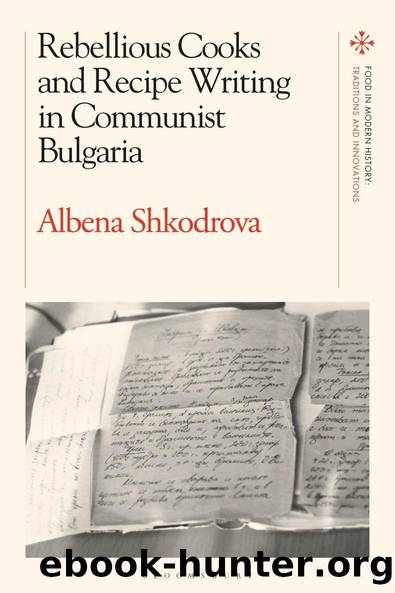Rebellious Cooks and Recipe Writing in Communist Bulgaria by Albena Shkodrova

Author:Albena Shkodrova [Shkodrova, Albena]
Language: eng
Format: epub
Tags: History, Modern, 21st Century, Social Science, Agriculture & Food, Technology & Engineering, Food Science, General, Social History
ISBN: 9781350132320
Google: E5cXEAAAQBAJ
Publisher: Bloomsbury Publishing
Published: 2021-01-28T22:32:25+00:00
SHARING THE KITCHEN WITH MEN
The idea of men helping in the kitchen only really appeared in the increasingly polyphonic public discourses in Bulgaria in the 1980s. Moreover, it seems that it stayed there: on the pages of the womenâs magazines that promoted it.
A survey in Zhenata dnes (Spasovska 1974), claiming that on average men spent 8 minutes a day working in the kitchen, while women spent 88, stated that men from the cities and with higher education tended to devote more time to cooking/cleaning the kitchen. However the personal perceptions and memories of the interviewed women did not offer any indication to confirm such a statement. They were equally consistent across the urbanârural, class or generation divisions: kitchens were âdefinitely female territoryâ, as Maya Mircheva put it.
The narratorsâ reminiscences of the participation of men in home cooking were quite uniform. Dani Tsacheva spoke of a very clear distinction between male and female work in her generation. To explain how strange cooking was to their partners, two of the women reacted with the same exclamation: âthey couldnât even fry an egg!â
Mara Tsenevaâs husband, who was present at the interview, nodded at this statement. He added that he knows how to prepare coffee and tea and he can actually boil eggs. But not fry them. âI am not interested, nor do I feel any desire [to cook],â he explained. Violeta Kaloferova, an engineer from Sofia, reacted to the question if men ever cooked at home with laughter. Dani Tsacheva suggested that it was a very exceptional role for a man and said that it was perceived as humiliating. According to her those men who did that risked being laughed at and called âeffeminateâ.
In fact men had their roles in the kitchen, but these were hardly related to everyday cooking. Particular types of operations or certain types of food were considered their prerogative and were far from shameful â they were even a source of pride taken in trading with advice between men. Menâs involvement was often related to seasonal cooking and/or meat. For instance cutting or curing meat was considered acceptable and even sometimes typically menâs work. I encountered a curious illustration of this fact, when in the flea market of Sofia I purchased a copy of Home Preservation of Meat and Fish (1959) by Marin Marinov. The title page was signed off by the author to another man (Figure 11).
The reminiscences of the narrators confirmed the legitimacy of menâs involvement in activities related to meat and fish. Bozhurka Velkova recalled her husband always cleaning the fish which she was to cook, and said that only men prepared home-made charcuterie: lukanka, sudzhuk or similar.4 Ivanka Atipova also remembered men trading recipes for how to prepare various parts of a slaughtered pig. Recalling her years in a minersâ town near the Turkish border in south-east Bulgaria she said that they often gathered in these periods to process the meat together. Lyubka Georgieva remembered her father preparing lard with herbs, and Vanya Pinteva recalled a relative making lukanki and pusturma5.
Download
This site does not store any files on its server. We only index and link to content provided by other sites. Please contact the content providers to delete copyright contents if any and email us, we'll remove relevant links or contents immediately.
Women and Jewish Marriage Negotiations in Early Modern Italy by Howard Tzvi Adelman(446)
Warrior King by Wilbur Smith(418)
The Battle of Austerlitz by 50minutes(314)
18 real-life stories of serial killers and murderers with solved and unsolved killings from the USA, UK, Europe, and beyond. by Ben Oakley(305)
Violence and Emotions in Early Modern Europe by Susan Broomhall;Sarah Finn;(300)
The American Crisis by Unknown(294)
Who's Who in the Zulu War, 1879: The British by Adrian Greaves Ian Knight(293)
Youth, Heroism and War Propaganda: Britain and the Young Maritime Hero, 1745â1820 by D. A. B. Ronald(292)
The Seeker by S. G. MacLean(249)
The Origins of French Absolutism, 1598-1661 by Alan James(240)
The Traitor of Colditz by Robert Verkaik(234)
The Dutch East India Company and British East India Company: The History and Legacy of the Worldâs Most Famous Colonial Trade Companies by Charles River Editors(229)
The Thirty Years War â Complete by Friedrich Schiller(227)
Fires of Faith by Catholic England under Mary Tudor(223)
A Genius for Confusion by Richard M. Fried(220)
The Slave Trade in Africa by Simon Webb;(219)
Interest and Connection in the Eighteenth Century by Jacob Sider Jost(218)
Invisible Worlds by Peter Marshall(215)
Witchcraft in Early Modern England by James Sharpe(211)
